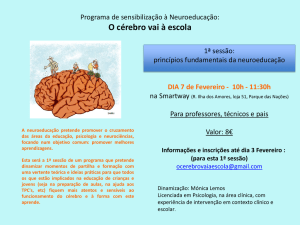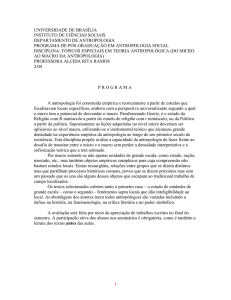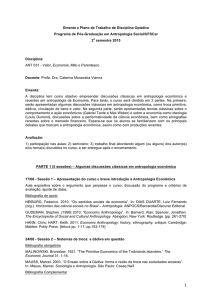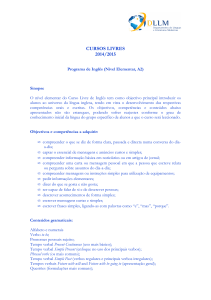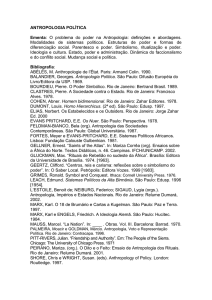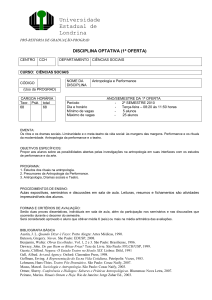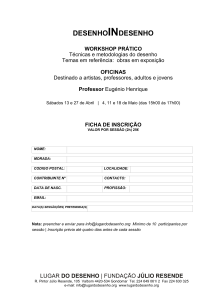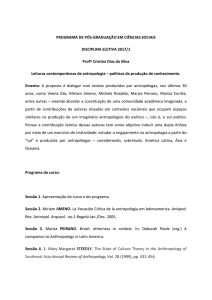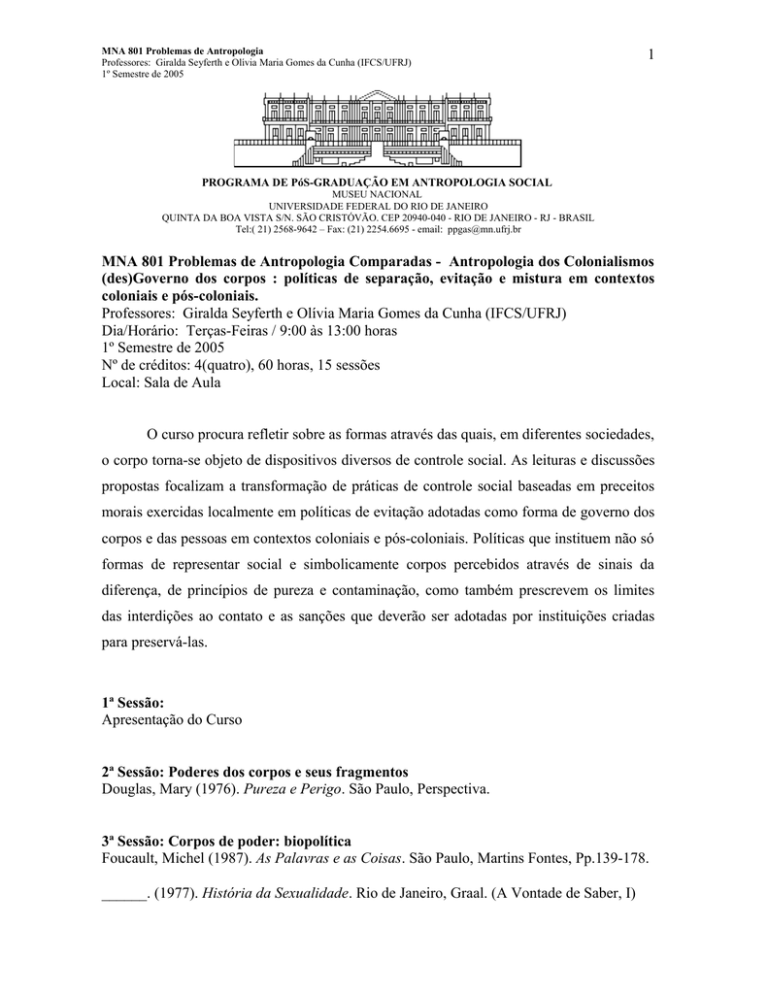
MNA 801 Problemas de Antropologia
Professores: Giralda Seyferth e Olívia Maria Gomes da Cunha (IFCS/UFRJ)
1º Semestre de 2005
1
PROGRAMA DE PóS-GRADUAÇÃO EM ANTROPOLOGIA SOCIAL
MUSEU NACIONAL
UNIVERSIDADE FEDERAL DO RIO DE JANEIRO
QUINTA DA BOA VISTA S/N. SÃO CRISTÓVÃO. CEP 20940-040 - RIO DE JANEIRO - RJ - BRASIL
Tel:( 21) 2568-9642 – Fax: (21) 2254.6695 - email: [email protected]
MNA 801 Problemas de Antropologia Comparadas - Antropologia dos Colonialismos
(des)Governo dos corpos : políticas de separação, evitação e mistura em contextos
coloniais e pós-coloniais.
Professores: Giralda Seyferth e Olívia Maria Gomes da Cunha (IFCS/UFRJ)
Dia/Horário: Terças-Feiras / 9:00 às 13:00 horas
1º Semestre de 2005
Nº de créditos: 4(quatro), 60 horas, 15 sessões
Local: Sala de Aula
O curso procura refletir sobre as formas através das quais, em diferentes sociedades,
o corpo torna-se objeto de dispositivos diversos de controle social. As leituras e discussões
propostas focalizam a transformação de práticas de controle social baseadas em preceitos
morais exercidas localmente em políticas de evitação adotadas como forma de governo dos
corpos e das pessoas em contextos coloniais e pós-coloniais. Políticas que instituem não só
formas de representar social e simbolicamente corpos percebidos através de sinais da
diferença, de princípios de pureza e contaminação, como também prescrevem os limites
das interdições ao contato e as sanções que deverão ser adotadas por instituições criadas
para preservá-las.
1ª Sessão:
Apresentação do Curso
2ª Sessão: Poderes dos corpos e seus fragmentos
Douglas, Mary (1976). Pureza e Perigo. São Paulo, Perspectiva.
3ª Sessão: Corpos de poder: biopolítica
Foucault, Michel (1987). As Palavras e as Coisas. São Paulo, Martins Fontes, Pp.139-178.
______. (1977). História da Sexualidade. Rio de Janeiro, Graal. (A Vontade de Saber, I)
MNA 801 Problemas de Antropologia
Professores: Giralda Seyferth e Olívia Maria Gomes da Cunha (IFCS/UFRJ)
1º Semestre de 2005
2
______. Sobre a história da sexualidade. Microfísica do Poder. Rio de Janeiro, Graal: 243276.
4ª Sessão: Micropolíticas: poder e governamentalidade
Foucault, Michel (1979). A governamentalidade. Microfísica do Poder. Rio de Janeiro,
Graal: 277-293.
______.A política da saúde no século XVIII. Microfísica do Poder. Rio de Janeiro, Graal:
193-207.
Leitura Complementar:
Foucault, Michel (1979)..Poder-corpo. Microfísica do Poder. Rio de Janeiro, Graal: 145152.
5ª Sessão: Desdobramentos e leituras de Foucault: corpo e (outros) regimes de poder I
Said, Edward W. (1986). Foucault and the Imagination of Power. Foucault: a critical
reader. David C. Hoy. New York, Backwell: 149-156.
Scott, David (1999). “Colonial Governmentality”. In: ____. Refashioning Futures:
Criticism after Postcoloniality. Princeton, Princeton University Press. Pp.23-52.
Thomas, Nicholas. (1994). Colonialism's culture: anthropology, travel, and government.
London, Polity Press (capítulo 4).
6ª Sessão: Desdobramentos e leituras de Foucault: corpo e (outros) regimes de poder
II
Stoler, Ann Laura (1995). Race and the Education of Desire: Foucault's history of
sexuality and the Colonial Order of Things, Duke University Press.
Leitura Complementar:
Stoler, Ann Laura & Cooper, Frederick, Eds. (1998).Introduction. In: ____. Tensions of
Empire: colonial cultures in a bourgeois world. Berkeley, University of California
Press.
7ª Sessão: Políticas de sangue em contextos coloniais I
Stolcke, Verena (1992). Racismo y Sexualidad en La Cuba Colonial. Madrid, Alianza
America.
Boxer, C. R. (1977). O império colonial português. Lisboa, Ed. 70. Capítulo 11, 279-303.
Carneiro, M. L. Tucci. (1983). Preconceito racial no Brasil Colônia. São Paulo,
Brasiliense. Capítulo II, 43-173.
MNA 801 Problemas de Antropologia
Professores: Giralda Seyferth e Olívia Maria Gomes da Cunha (IFCS/UFRJ)
1º Semestre de 2005
3
8ª Sessão: Políticas de sangue em contextos coloniais II
Stoler, Ann (1996). Sexual affronts and racial frontiers: european identities and the cultural
politics of exclusion in Colonial Southeast Asia. In: Geoff Eley & Ronald Grigor Suny.
(orgs.) Becoming National: a reader. Oxford, Oxford University Press: 286-323.
Williams, Brackette (1994). Classification Systems revisited: Kinship, Caste, Race, and
Nationality as the flow of blood and the spread of rights. In: Yanagisako, S & Delaney,
Carol. (orgs.) Naturalizing Power: essays in feminist cultural analysis. New York,
Routledge: 201-36.
Lazarus-Black, Mindie (1994). Legitimate Acts and Illegal Encounters: law and society in
Antigua and Barbuda. Washington, D.C., Smithsonian Institution Press. Capítulo 4,
pp.: 73-101.
Domínguez, Virgínia R. (1977). "Social Classification in Creole Louisiana." American
Ethnologist: 589-602.
9ª Sessão: Políticas de Estado: aperfeiçoamento e engenharia eugênica
Stepan, Nancy (1991). 'The hour of Eugenics' - race, gender, and nation in Latin America.
Ithaca, Cornell University Press.
10ª Sessão: Políticas de Estado: aperfeiçoamento e engenharia eugênica II
Comaroff, Jean (1991). Medicine: Symbol and Ideology. The Problem of medical
Knowledge: Examining the Social Construction of Medicine. P. Wright and A. Treacher.
Edinburgh.
Larson, E. J. (1995). Sex, race and science. Eugenics in the Deep South. Baltimore, the
Johns Hopkins University Press. Capítulos 2, 4 e 5, pp.: 18-39; 63-118.
Taguieff, Pierre-André (1994). "Eugénisme ou décadence? - L'exception française."
Ethnologie Française XXIV.
11ª Sessão: Doença, Diferenças e Comunidades:
Vaughan, Megan (1991). Curing their ills: colonial power and African Illness. Stanford,
Stanford University Press.
Hunt, Nancy Rose (1998). "Le bébé en brousse" european women, african birth spacing,
and colonial intervention in breast feeding in the Belgian Congo. Tensions of Emprire.
A & Cooper Stoler, F. Berkeley, University of California Press: 287-321.
12ª sessão: Corpo, violência e políticas de mutilação
Comaroff, Jean (1993). The Desease heart of Africa: medicine, colonialism, and the Black
MNA 801 Problemas de Antropologia
Professores: Giralda Seyferth e Olívia Maria Gomes da Cunha (IFCS/UFRJ)
1º Semestre de 2005
4
Body. Knowledge, Power, and Practice: the anthropology of medicine and everyday
life. Shirley Lindenbaum and Margaret Lock, University of California. 305-329.
Kennedy, JG (1970) Circumcision and Excision in Egyptian Nubia, Man, New Series,
52:175-91.
Abusharaf, R. M. 2001. Revisiting Feminist Discourses on Infibulation: Responses from
Sudanese Feminists. In Shell-Duncan, B. & Y. Hernlund (eds.) Female “Circumcision”
in Africa: Culture, Controversy and Change. Boulder London : Lynne Rienner
Publishers.
13ª sessão: Biomercado:
White, Luise (1998). Cars out of Place: vampires, technology, and labor in East and Central
Africa. Tensions of Empire: colonial cultures in a bourgeois world. Ann Laura Stoler
and Frederick Cooper. Berkeley, University of California Press: 436-460.
Scheper-Hughes, Nancy (2004). "Parts Unknown: undecover ethnography of the organstrafficking underworld." Ethnography 5(1): 29-73.
Leitura Complementar:
Sharp, Lesley. (2000). A. The commodification of the body and its parts. Annual Review of
Anthropology, Vol. 29: 287-328,.
14ª sessão: Biopolítica, Biotecnologia e Gênero
Proctor, Robert (1988). From anthropologie to rassenkunde in German Anthropological
tradition. Bones, Bodies, Behavior - essays on biological anthropology. George W.
Stocking. Madison, The University of Wisconsin Press. 5.
Haraway, Donna (1989). The Bio-politics of a multicultural field. In: D. Haraway Primate
Visions: gender, race, and nature in the World of Modern Science. New York &
London. Routledge: 244-275.
15ª sessão: Technologias Reprodutivas e Gênero
Haraway, D. (1993). The Biopolitics of postmodern bodies: determination of self in
immune system discourse. Knowledge, Power, and Practice: the anthropology of
medicine and everyday life. Shirley Lindenbaum and Margaret Lock, University of
California. 364-410.
Stolcke, Verena (1988). "New Reproductive Technologies: the old quest of fatherhood."
Reproductive and Genetic Engineering 1(1): 5-19.
MNA 801 Problemas de Antropologia
Professores: Giralda Seyferth e Olívia Maria Gomes da Cunha (IFCS/UFRJ)
1º Semestre de 2005
Leitura Complementar:
Stolcke, Verena (s/d). Homo Clonicus: the Sex of Biotechnology. (ms).
5


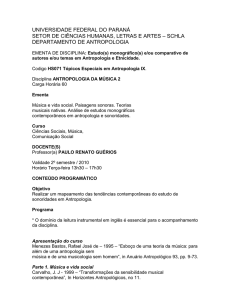
![Antropologia [Profa. Ol via]](http://s1.studylibpt.com/store/data/000329787_1-86f1de23ef4fc8c4b10e2491c0fd4e18-300x300.png)

